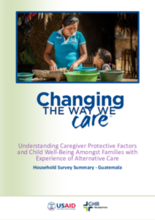A key feature of CTWWC’s theory of change is building evidence on children's care and reform, particularly regarding reintegration from residential care, transitions to family-based care, and preventing separation. Therefore, CTWWC has undertaken surveys with families supported by CTWWC’s demonstration efforts, with the aim of providing insights for policymakers and practitioners on the impacts of interventions to support reintegrating families and those at risk of separation. To this end, the survey addressed the following research questions:
- What aspects of family strengthening support do caregivers think have affected (negatively and positively) their ability to care and provide for their children?
- What proportion of children and caregivers report selected protective factors (see box 1) in their life?
- What proportion of children at risk of separation from their families or who have been reunified or placed in family-based care are experiencing positive well-being (see box 2)?
- How might caregiver protective factors correlate with child well-being?
- How has the perceived well-being of children changed after their engagement with CTWWC?
The survey tool was developed in 2021, combing validated measures (including on disability, parenting skills, protective factors, hunger etc.), with a new measure on child well-being with input from children and young people in Guatemala and Kenya (see box 2). For Guatemala, the tool was translated into Spanish, with some adaptations to fit the local context by adjusting terminology.
There were three main components to the survey:
- a section for primary caregivers to respond to about themselves and their household covering demographics, protective factors, parenting and economic stability,
- a section for caregivers to respond to about the child in their care who had been reunified or placed in their care from residential care, or a randomly selected child if the family was receiving support to prevent separation covering child’s demographics, disability, care history, health and education, and
- a section for children aged 11 years and older to respond to about their health, education, well-being, and family and community acceptance.
Selection, invitation and informed consent procedures were undertaken in line with approved protocols (Boston College Institutional Review Board).
In Guatemala, the survey in 2023 targeted all families who had participated in a case management process with CTWWC due to a reintegrating child or a child identified as at risk of separation, as well as a sample of households where the caregiver had attended a parenting school. From this population, 59 households who have received support through case management (mostly for reintegration) met the inclusion criteria, with 47 (80%) completing the survey. In addition, a random sample of 66 households where a caregiver had participated in a parenting school in Zacapa Department were included, with 61(92%) participating in the survey. Data was provided on 69 children by caregivers (39 children who had reintegrated with family and 25 who were considered at risk of separation). Forty-five children aged 11 and over who were identified to participate as respondents, of whom, 30 (67%) completed the survey. Apart from the respondents selected from parenting schools, all the caregiver and child respondents participated in both the 2021 and 2023 surveys, allowing for comparison over time.

